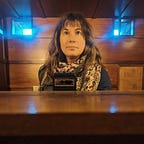Minestrone, 2023
Death, dying, and our loved ones
We are driving looking for soup from a grocery she can’t remember the name of in a town that she believes is somewhere south of here. My grandmother will turn 99 in a few months and has been talking about this soup long before I even got into town and now my headlights are cutting into the long shadows running across the road as the winter’s sun sets to the east. She knows the grocery has a red door but isn’t sure if it will be open on a Sunday night.
I like that we can do this together and it’s okay, it’s a little unplanned, she says to me over the too-loud engine of my little Ford. She is looking out the window at the houses spinning by. Lights are coming on in carports and on front porches and are shimmering through the trees as the forest becomes dark. It’s been a few years since she has been able to drive and when I helped her into the car tonight I noticed she ran her shaky, veined hand across the plastic of the dashboard momentarily, as if to see if it were real.
Is my walker in the back? she asks, trying to turn her head to see. Yes, I folded it up and it’s right back there, I assure her. But what about my pocketbook? We need to stop to see if we brought it. I tell her it is there, and if her wallet isn’t inside I remind her that I have mine and can pay. Oh, okay, she says and we drive on in silence for a bit as she thinks about that.
She asks me to read her the street names as we drive so she can navigate but I think she just likes to hear them. Chestnut. Wards Ferry. Sangamore. It is hard to tell what she is thinking, but I’m thinking she is remembering. Was there someone she knew on Chestnut? Was there preschool on Wards Ferry? Perhaps she is remembering a child’s birthday party with cake on a blanket in the backyard; remembering a call from an old friend and taking it at the phone at the top of the stairway; remembering my grandfather, my uncle, her mother; remembering an errand, perhaps to the drugstore or the post office, something that felt so meaningless then, why does it feel so clear now? Why is it here, this plain memory, vivid this night in February, with the darkness setting into the trees?
I can’t remember the grocery store’s name or the soup that I like, she says to me, laughing a bit at herself, and then tells me that my cousin has gotten another dog. She tells me about riding a train across the country and that she had to change cars in Chicago. She tells me that she plays bridge on Sundays but some of the women are a bit like a clique. She worries again about her pocketbook. She asks me if I know where I am going, she doesn’t seem to mind when I tell her I do not.
We are both like this, she tells me. Carefree. We can do this, drive like this.
We can, I agree.
She holds her seatbelt a little away from her body so it doesn’t smother her, she grips the car door when I bring the car around a curve. I think she still finds us, women, driving together at night to possibly nowhere, a novelty. Something that couldn’t have happened before, in the times of her memories. McAllister. River Road. Pool’s Creek. I think that now she may purposefully not be telling me where to turn, that she may be just letting us go around the bends and curves and through the traffic lights as if the evening and the quest for soup could last forever. How much gas do you have? she asks me. A quarter tank, I say. We are fine.
I don’t know if I have my pocketbook, she worries again. You’ll have to give me some time to get organized.
It’s okay, I tell her. She unfolds and refolds the scarf she has on her lap.
My mind is a well, she says.
And then she says it again.
We find the little town and find the grocery store with the red door and a sign in the window flashing “open” into the night. We find the soup that she wanted and we drive home with it in a bag behind my seat, the car smelling like minestrone. It’s fully dark by the time we heat it up in her microwave, spoon it into our mouths out of pottery mugs in the quiet of her apartment under her presidential coin collection and over her braided rugs. I do the dishes and leave them to drain. She comes up with reasons for me not to go, has me find a photo album, get oranges out of the fridge, get extra paper towels in case they are sticky.
Do you have a knife? she asks.
A pocket knife, I reply.
Well then, she says.
I kiss her head and cry heavily as I drive away. I will probably never see her again.
